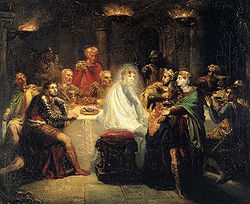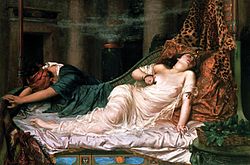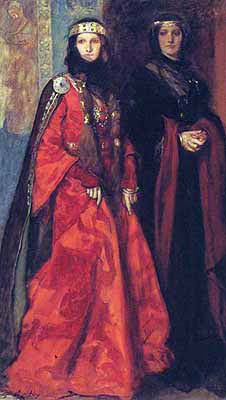A

- Aaron is an evil Moorish character in Titus Andronicus . He incites most of the other evil characters to do violence against the house of Andronicus. [1]
- The Abbott of Westminster (fict) supports Richard and the Bishop of Carlisle in Richard II.
- Lord Abergavenny (hist) is Buckingham's son-in-law in Henry VIII.
- Abhorson is an executioner in Measure for Measure .
- Abraham Slender is a foolish suitor to Anne, and a kinsman of Shallow, in The Merry Wives of Windsor .
- Abraham, a Montague servant, fights Sampson and Gregory in the first scene of Romeo and Juliet . Sometimes spelled "Abram".
- Achilles (myth) is portrayed as a former hero, who has become lazy and devoted to the love of Patroclus, in Troilus and Cressida .
- Adam is a kindly old servant, rumoured to have been played by Shakespeare himself, in As You Like It .
- Adrian:
- Adrian is a lord, a follower of Alonso, in The Tempest. [2]
- For Adrian in Coriolanus, see Volsce.
- Adriana is the frequently angry wife of Antipholus of Ephesus in The Comedy of Errors .
- Don Adriano de Armado is an arrogant Spanish braggart in Love's Labour's Lost .
- Aediles (officers attending on the Tribunes) appear in Coriolanus. One is a speaking role.
- ForAegeon(or AEgeon or Ægeon) see Egeon.
- Aemelia is an abbess in The Comedy of Errors . She proves to be the long-lost wife of Egeon, and the long-lost mother of the Antipholus twins.
- Aemilius:
- Aemilius or Emillius is Roman nobleman who acts as ambassador between Saturninus and Lucius in Titus Andronicus . [3]
- Marcus Aemilius Lepidus (hist) is one of the Triumvirs. the three rulers of Rome after Caesar's death, in Julius Caesar and Antony and Cleopatra .
- Aeneas (myth) is a Trojan leader in Troilus and Cressida .
- ForAenobarbus(or AEnobarbus or Ænobarbus) see Enobarbus.
- Agamemnon (myth) is the general leader of the Greek forces, in Troilus and Cressida .
- Agrippa:
- Agrippa (hist), a follower of Caesar in Antony and Cleopatra , proposes that the widowed Antony should marry Octavia.
- Menenius Agrippa in Coriolanus is a friend and supporter of Coriolanus in his political struggles.
- Sir Andrew Aguecheek is a foolish knight, and suitor to Olivia, in Twelfth Night .
- Ajax (myth) is the (sometimes foolish) champion of the Greeks in Troilus and Cressida .
- Alarbus is the eldest son of Tamora, sacrificed by Titus' sons, in Titus Andronicus .
- The Mayor of St. Albans appears briefly in the "Simpcox" episode in Henry VI, Part 2 .
- The Duke of Albany is Goneril's husband in King Lear .
- Alcibiades (hist) is a soldier who turns renegade when one of his junior officers is sentenced to death, and true friend of Timon in Timon of Athens .
- The Duke of Alençon (hist) is one of the French leaders in Henry VI, Part 1 .
- Alexander:
- Alexander is Cressida's servant in Troilus and Cressida .
- Alexander Court (fict) is a soldier in the English army in Henry V. [4]
- Alexander Iden (hist) kills Jack Cade in Henry VI, Part 2 .
- Alexas is a follower of Cleopatra, in Antony and Cleopatra .
- Alice:
- ForAlienasee Celia from As You Like It, who calls herself Aliena while in her self-imposed exile in the Forest of Arden.
- Alonso is the King of Naples, an enemy to Prospero, in The Tempest. He mourns for his son, Ferdinand, whom he believes is drowned. [2]
- Ambassador:
- Some ambassadors from France present Henry with a gift of tennis balls from the Dauphin, in Henry V. [4]
- Some ambassadors from England bring news that Rosencrantz and Guildenstern are dead, in Hamlet .
- Several characters act as Ambassadors, including Cornelius (in Hamlet), Lucius (in Cymbeline), Montjoy and Voltemand.
- See also Schoolmaster, in Antony and Cleopatra.
- Amiens is a follower of Duke Senior in As You Like It .
- For Ancient (in the military sense – a standard-bearer), see Iago and Pistol.
- Andromache (myth) is Hector's wife in Troilus and Cressida .
- Andronicus:
- Marcus Andronicus is the brother of Titus Andronicus .
- Titus Andronicus is the central character of Titus Andronicus . Broken and sent mad by Tamora and her followers, he eventually exacts his revenge by killing her sons, and cooking them for her to eat.
- See also Lavinia, Lucius, Quintus, Martius, Mutius and Young Lucius, members of the Andronicus family in Titus Andronicus. Also Sempronius, Caius and Valentine in the same play are "kinsmen" of the Andronicus house.
- Angelica is Juliet Capulet's nurse in Romeo and Juliet .
- Angelo:
- Angelo deputises for the Duke during the latter's absence from Vienna, but proves corrupt, seeking the sexual favours of Isabella, in Measure for Measure .
- Angelo is a goldsmith who has been commissioned to make a chain by Antipholus of Ephesus, which he delivers to Antipholus of Syracuse in error. Antipholus of Ephesus later refuses to pay for it, causing much consternation, in The Comedy of Errors .
- Angus is a thane in Macbeth .
- Anne:
- Anne Bullen (hist), known to history as Anne Boleyn, is a maid of Honour to Katherine and later becomes King Henry's second wife, in Henry VIII.
- Anne Page is the daughter of Master and Mistress Page in The Merry Wives of Windsor . She loves Fenton, but her father wishes her to marry Slender and her mother wishes her to marry Caius.
- Lady Anne (hist) is the widow of Prince Edward, wooed by Richard over the corpse of her late father-in-law (Henry VI) in Richard III.
- Antenor is a Trojan leader in Troilus and Cressida .
- ForAnthonysee Antony/Anthony below.
- Antigonus is a courtier of Leontes in The Winter's Tale , who takes the infant Perdita to Bohemia. He famously exits, pursued by a bear, which eats him.
- Antiochus is king of Antioch in Pericles, Prince of Tyre ; he engages in an incestuous relationship with his daughter. He orders the death of Pericles, who has discovered his secret.
- Antipholus:
- Antipholus of Ephesus, twin of Antipholus of Syracuse – with whom he is often confused, is a central character in The Comedy of Errors .
- Antipholus of Syracuse, twin of Antipholus of Ephesus – with whom he is often confused, is a central character in The Comedy of Errors .
- Antonio:
- Antonio is the title character, although not the central character, of The Merchant of Venice . Shylock claims a pound of his flesh.
- Antonio is the brother of Leonato in Much Ado About Nothing .
- Antonio is a sea captain who rescues, and loves, Sebastian in Twelfth Night .
- Antonio is the brother of Prospero in The Tempest. He conspires with Sebastian to murder Alonzo and Gonzalo. [2]
- Antonio is Proteus' father, in The Two Gentlemen of Verona .
- Antony/Anthony:
- For Anthony in Romeo and Juliet see Servingmen.
- Mark Antony (hist) (Often just Antony, and sometimes Marcus Antonius) turns the mob against Caesar's killers and becomes a Triumvir in Julius Caesar. His romance with Cleopatra drives the action of Antony and Cleopatra .
- Sir Anthony Denny (hist) is a minor character in Henry VIII, who brings Cranmer to the King.
- Apemantus is a churlish philosopher in Timon of Athens .
- Three Apparitions appear to Macbeth with prophecies, in Macbeth .
- Apothecary is a small but vital role in Romeo and Juliet . He sells Romeo the poison which ends his life.
- For Aragon, see Arragon/Aragon, below.
- For Arcas, see Countryman.
- Archbishop:
- Archbishop of Canterbury:
- The Archbishop of Canterbury (hist) is an important character in the first act of Henry V. He expounds Henry's claim to the French throne. [4]
- Thomas Cranmer, Archbishop of Canterbury (hist) is a major character in the last act of Henry VIII: hauled before the privy council by his enemies and threatened with imprisonment, but protected by the king.
- See also Cardinal Bourchier, who was Archbishop of Canterbury at the time dramatised in Richard III.
- Archbishop of York:
- The Archbishop of York (1) (hist) is one of the rebel leaders in Henry IV, Part 1 and Henry IV, Part 2 . [5]
- The Archbishop of York (2) (hist) assists Queen Elizabeth and the little Duke of York to obtain sanctuary in Richard III.
- Archbishop of Canterbury:
- For Archibald, see Earl of Douglas.
- Archidamus is a Bohemian lord in The Winter's Tale .
- Arcite and Palamon are the title characters of The Two Noble Kinsmen . Their friendship endures even though they engage in a mortal quarrel for the love of Emilia.
- Ariel is a spirit, controlled (but eventually freed) by Prospero in The Tempest. [2]
- Don Adriano de Armado is an arrogant Spanish braggart in Love's Labour's Lost .
- Arragon/Aragon:
- The Prince of Arragon is an unsuccessful suitor to Portia in The Merchant of Venice .
- Queen Katherine of Aragon (hist) is the first wife of King Henry in Henry VIII. She falls from grace, is divorced and dies.
- See also Don Pedro, who is a prince of Arragon.
- Artemidorus prepares a scroll warning Julius Caesar of danger, and tries to present it to Caesar in the form of a petition. Caesar refuses to accept it.
- Arthur (hist) is a child, the nephew of the king in King John . He persuades Hubert not to put out his eyes, but dies in an attempt to escape captivity.
- Arviragus (also known as Cadwal) is the second son of the king in Cymbeline , stolen away in infancy by Morgan, and brought up as Morgan's child.
- For Astringer, meaning a keeper of hawks, see Gentleman in All's Well That Ends Well, who is described as the "Astringer to the King" in his entry stage direction.
- An Old Athenian in Timon of Athens objects to his daughter's involvement with Lucilius, until Timon offers to endow Lucilius with money to make him her equal.
- An attendant on the King of France speaks four words, "I shall, my liege", in All's Well That Ends Well .
- Audrey is a country girl who marries Touchstone in As You Like It .
- Tullus Aufidius, leader of the Volscians, is the arch-enemy, and briefly the ally, of the title character in Coriolanus.
- Aumerle (hist) is a companion of Richard in Richard II.
- ForDuke of Austriasee Limoges.
- Autolycus is a rogue, singer, and snapper up of unconsidered trifles in The Winter's Tale .
- The Countess of Auvergne (hist) tries to entrap Talbot in Henry VI, Part 1 .















